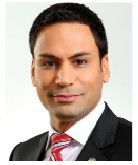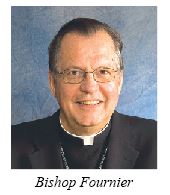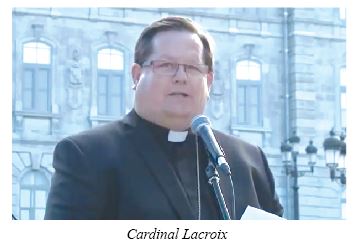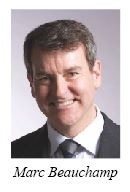 On June 5, 2014, Bill 52, “an act respecting end-of-life care”, was adopted by members of the National Assembly (the Parliament of the Province of Quebec): 94 members voted in favor of the bill (including all members of the Parti Quebecois and the Coalition Avenir Quebec), and 22 Liberal Members of the National Assembly (out of the 70 members of the ruling party) voted against. 9 members were absent during the vote.
On June 5, 2014, Bill 52, “an act respecting end-of-life care”, was adopted by members of the National Assembly (the Parliament of the Province of Quebec): 94 members voted in favor of the bill (including all members of the Parti Quebecois and the Coalition Avenir Quebec), and 22 Liberal Members of the National Assembly (out of the 70 members of the ruling party) voted against. 9 members were absent during the vote.
This new law authorizes any qualified person to apply for, and to obtain, death on demand from a physician. Rather than use the words “euthanasia” or “assisted suicide”, the law speaks instead of “medical aid in dying”, even though the process is exactly the same; an injection that causes death.
As was written in the citizen’s network, Living with Dignity, “Now, in Quebec, the act of a doctor who kills a person at his request to end his suffering, instead of relieving the suffering, will be considered health care... With some exceptions, our elected officials have also chosen to ignore that Quebec does not have jurisdiction to decriminalize euthanasia. Killing a patient, even at his or her request, is not a medical treatment; it is a homicide and, as such, prohibited by the Criminal Code.”
In defining euthanasia as “health care” under the provincial jurisdiction, the Quebec government is trying to circumvent the prohibition of the Criminal Code. Opponents maintain that they will challenge the law before the Supreme Court of Canada because to cause one to die can never, in any case, be considered health care.
Bill 52 came very close to being adopted last March under the PQ government of Pauline Marois, but the provincial elections prevented the holding of a final vote. Liberal leader, Philippe Couillard insisted that all members of parliament who wished to speak on the bill could do so, which, normally, is proper procedure but which, instead, caused the bill to fall through for lack of time; it was technically dead.
 A peculiar sight: Former PQ minister Veronique Hivon and Liberal minister Gaétan Barrette set to reintroduce the “aid in dying” bill. As the other guy says, “We did not vote for this …” A peculiar sight: Former PQ minister Veronique Hivon and Liberal minister Gaétan Barrette set to reintroduce the “aid in dying” bill. As the other guy says, “We did not vote for this …” |
On election day, April 7, the Parti Quebecois suffered an historic “thaw”, the Liberals, with Philippe Couillard, took power with 70 members. The people of Quebec had clearly said “no” to the Parti Québécois of Pauline Marois, not only because of the so-called Charter of Values, but also because of Bill 52 on euthanasia.
But to everyone’s surprise, once elected by majority vote, Philippe Couillard announced on May 22, that he would represent Bill 52 in Parliament exactly as it was during the elections, without any amendments, and that this project would become law before the end of the parliamentary session on June 13. He therefore resurrected a dead bill which had been unacceptable to him just before the elections. Here is a turn-around that can easily be classified as treason… or cowardice... The people voted Liberal, but it was as if the PQ had remained in power!
We have a new and unprecedented situation here: Bill 52 is jointly reintroduced by the Liberal Minister of Health, Gaétan Barrette, and the former PQ minister responsible for the bill, Véronique Hivon. PQ and Liberal Members of the National Assembly working hand in hand to expedite the legalization of euthanasia.
According to parliamentary procedures, to reintroduce the bill as it was at the time of election would require the unanimous consent of all members of the National Assembly, regardless of party allegiance. However, the Minister of Health, Gaétan Barrette, affirmed that day that the free vote would apply only to the vote at third reading and not to the motion of reintroduction. He added that the bill would be presented without amendment, not even those proposed by the Liberal Party while he was in opposition, and which had been beaten by the PQ majority.
In other words, those who would have wanted to oppose the reintroduction of this bill on euthanasia would have been expelled from their party. It was therefore a free vote... but not exactly. It took powerful resolve to get this bill passed, no matter the cost and despite the opposition of the majority of the population, as well as the physicians in palliative care, namely, those doctors who care for the terminally ill.
 The dice were loaded, so the law should pass. Most revealing of all on this subject was what was said before the final vote in parliament by Liberal member, Gerry Sklavounos, MNA for Laurier-Dorion (photo):
The dice were loaded, so the law should pass. Most revealing of all on this subject was what was said before the final vote in parliament by Liberal member, Gerry Sklavounos, MNA for Laurier-Dorion (photo):
“It is an obligation for me to speak on this subject before voting... I was a member of the traveling commission. I visited my constituents, I listened to them and I returned with my colleagues, trying to write recommendations. At one point, I realized that the power in favor of physician-assisted dying was strong. I was against the current and I risked being swept away. I chose at this time to no longer participate, to resign in a way from this commission instead of signing recommendations with which I did not agree…
“I thought, I read, I listened. I consulted. I could in no way ever consider an act which causes death, as a treatment. Whenever I am faced with difficult questions like this one, I go back to basics, to my roots which I am proud of. Allow me to make just this one quote. I will not quote anything else. The rest will be said very personally:
“I will give no deadly medicine to any one if asked, nor suggest any such counsel.”
“Obviously, these are not my words. These are the words of the father of medicine, as he is often referred to, Hippocrates, five centuries before Christ. But when I return to these sources and ponder, what is a treatment? We treat to heal. We treat to help a person be more comfortable. We treat to remove symptoms. I can not consider the act of causing death as a treatment. A treatment is taken during a lifetime to try to improve it. Causing death is the cessation of treatment, it is the ceasing of efforts, it is the end of the life process. And for me, it can in no way be considered healthcare…
“The basis, the very first rule of society, I think it is also the first Commandment, it has been a long time since I have looked, it is to not kill, to not take away life. This is how the criminal law operates. And for me, it is most definitely not a means of health care.”
On May 13, 2014, the Feast of Our Lady of Fatima, Archbishop Pierre-André Fournier of Rimouski, President of the Assembly of Quebec Catholic Bishops, wrote the following letter:
“The new government of Quebec has made known its plan to put back on the National Assembly’s agenda a proposed bill concerning “end-of-life care” that would allow physicians to practice euthanasia. Such a law would have serious and destructive consequences for the future of Quebec.
 “To cause death is not a form of care. Using expressions like “dying with dignity” and “medical aid in dying” to describe lethal injections only misleads and sows confusion. We are talking about euthanasia, pure and simple.
“To cause death is not a form of care. Using expressions like “dying with dignity” and “medical aid in dying” to describe lethal injections only misleads and sows confusion. We are talking about euthanasia, pure and simple.
“Of course we understand the anguish and sorrow of all those who have listened to a loved one ask for death in the throes of dying painfully; nobody could remain indifferent to such distress. However, the real answer of medicine and of society to this situation is palliative care: palliative care is the best way to soothe the suffering of one who is approaching the end of life, and to help them to live this final step with humanity and dignity.
“Palliative care has proven its worth. Here in Quebec, we have all the skill and all the experience needed to make palliative care available in every region. This is what we hope for from the National Assembly: that Québec should craft for itself a policy on universal palliative care.
“Let us pray, then, for our MNAs, that every one of them might open his or her heart and conscience to the working of the Holy Spirit. Let us not hesitate to contact them, in person, in a group letter, or even by means of a petition, to ask that all Quebecers might, at the end of their lives, benefit from real care for the dying – in the form of palliative care, and not of euthanasia which is its opposite.
“Over the next few weeks, may our prayer for these intentions be frequent and intense and be nourished by the Word of God and the Sacraments. Let us pray by ourselves, in heart-to-heart communication with the Lord, and also with others, in the liturgy, adoration, praise and worship, and the Rosary. Finally, as the great tradition of the Church invites us to, let us join acts of penance, fasting, self-giving and sharing to our prayer.”
On June 6, the day after the adoption of Bill 52, Bishop Fournier wrote the following letter, as President of the Assembly of Bishops of Quebec:
“The passage of the law that authorizes euthanasia at the end of life, under the name “medical aid in dying,” is a source for us of deep disappointment and keen anxiety.
“The breakdown of the vote on this bill in the National Assembly – 94 MNAs voting “yea” and 22 “nay” – reflects the lack of consensus on this subject in our society. There are very many citizens who cannot accept that the ability to demand a lethal injection is a right.
“Of course we understand the anguish and sorrow of everyone who has ever heard a loved one ask for death during a difficult end-of-life phase. The authentic response of society and of medicine to such a situation is palliative care. Palliative care is the best way to allay the suffering of a person who is approaching the end of her life, and to help her to live this final step with humanity and dignity.
“We affirm our solidarity and support to all those who labour in the domain of palliative care. It is our hope that such care will be offered in all regions of Quebec as soon as possible. We can hear Pope Francis reminding us: ‘Do not let your hope be stolen.”
“For medical personnel who will be facing requests for euthanasia, we wish the strength and courage to invoke the right of conscientious objection. Our support and our prayer accompanies you.
“Finally, we wish to restate our deep conviction, which is that of the Church, that human life must be protected and respected until its natural end. Euthanasia, even if legal, is utterly contrary to the dignity of life and of the person.”
 Yes, to palliative care; no, to euthanasia
Yes, to palliative care; no, to euthanasiaOn June 3, 2014, two days before the final vote in the National Assembly, a vigil in protest of Bill 52 was held in front of the Quebec Parliament. There were several speakers, including Cardinal Gérald Cyprien Lacroix, Archbishop of Quebec and Primate of Canada. Here are excerpts from his speech:
“Throughout our history, people have struggled to survive and to be respected. Today, life is again threatened. The people we have elected to represent us and to govern us are preparing to vote on a bill that aims to legalize euthanasia; nothing less. The tumult that prevails in this debate is due, among other things, to a wording that is unclear and which has many people confused. The use of the word euthanasia has been avoided at all costs. Instead, the term “end-of-life” has been slyly inserted as if this were a means of health care. Whereas, a medical procedure is NEVER meant to cause death, but to heal and to comfort.
“Our elected officials have tried to convince us that there is a public consensus on this bill. The reality is quite different. There is no consensus among the population, no more than there is in the National Assembly. Several members disagree or are very uncomfortable about Bill 52. At most, there is an agreement between the leadership of political parties in supporting this bill. I dare hope that each member will vote according to his conscience and his own convictions, and be respected for that, as the outcome of this debate will have very serious consequences for our future as a people.
“At the community level, listening to the people of our cities and towns conversing with older people and even younger ones, we clearly understand the deep concern. This bill which, if accepted and if it becomes law, will transform doctors and nursing staff into agents who will, not only treat patients but who can also inflict death and facilitate assisted suicide. This has never been seen in Quebec! I would not like to be in the shoes of the doctor or nurse who would have to live with this heavy responsibility. In room 5, we are doing everything in order to heal the patient, relieve and save his life. In room 6, a drug, under the pretext of a medical procedure, “respecting end-of-life care”, is injected, causing death. These two realities can not coexist.
“Indeed, we have been reassured that this bill on end-of-life care has nothing to do with Quebec’s economic situation, even though it is very precarious. Nor does it have anything to do with the ever-increasing costs related to healthcare. Neither does it have any link to the fact that we have an aging population who are becoming more and more expensive to treat and who live longer and longer. No, we have been reassured that it is none of these things which have precipitated this bill, but in my conversations with many of the people I work with, this is not so clear in their minds.
“They try to make us believe that the application of this law would be clearly defined, that we have nothing to fear, that there would be no danger of mishaps for Quebec. Other countries in Europe that have already opened the door to euthanasia with the same promises, now find themselves in front of a very different reality.
“Take the example of Belgium, which legalized euthanasia in 2002. When it became legal, they predicted that there would be very few cases where conditions would necessitate the use of a lethal injection being given. With committees of doctors and health professionals that would accompany the process, the Belgians had nothing to fear. Their deaths (excuse me); their lives were in good hands.
“Where are they now, barely 12 years later? Recent reports reveal that last year, 5 patients per day opted for euthanasia, an increase of 27% compared to the previous year. Is this what we want for Quebec? I say no! And that’s not all. In February this year, Belgium became the first country to legalize euthanasia for children and adolescents, and without any set age requirement.
“Where will it all end? With my brother Bishops of Quebec, I say: do not open the door to euthanasia. The only end of life care that is worthy and acceptable to our people is palliative care. Moreover, a large proportion of physicians who have been working in palliative care for decades, and who are the real experts on the subject, are against this bill. And we support them because they know what they are talking about. They have often spoken out during this debate, but they were not heeded.
“What our government should do is to make every effort to provide palliative care in support of those who have reached the end of their lives, in the urban communities as well as in the nearby and more remote regions. This is what we need to offer to the people of Quebec so that they may end their lives in dignity. We do not have the right to destroy what we are not able to create; that is to say, a human life!
“That is why I join with you today in inviting the members of the Quebec National Assembly to vote against Bill 52 as it is currently being presented. Let us seriously consider developing greater access to palliative care for everyone all across Quebec so that there never will be a need for euthanasia. The people of Quebec can meet this challenge if they make up their minds to do so. Let us be defenders of human life and become leaders in the respect of all human life. Our future depends on it!
“As believers, as Christians and as Catholics, we continue to pray so that our members can make informed decisions for the well-being of the population, decisions that respect all human life.”
Supporters of Bill 52 say that it is a matter of compassion to let people choose to die if they do not want to suffer. This is a false argument since modern medicine, with palliative care, can virtually eliminate all these sufferings. In a letter published in the June 16, 2014 issue of the Journal de Montreal, Dr. Marc Beauchamp, an orthopedic surgeon who signed the Doctor’s Collective Against Euthanasia, and is President of the group Living In Dignity, explains what really happened behind the scenes for the passage of Bill 52:
 “It is not a question of suffering in the last days that was the goal of the proponents of Bill 52. That is only an alibi, the moral justification, which suggests that we want this law so as not to leave the dying in their pain. However, as doctors we know that our methods of treating pain are extremely effective, and my palliative care colleagues know this better than anyone. They therefore went to present this to the commission, Dying With Dignity, in order to let politicians know this.
“It is not a question of suffering in the last days that was the goal of the proponents of Bill 52. That is only an alibi, the moral justification, which suggests that we want this law so as not to leave the dying in their pain. However, as doctors we know that our methods of treating pain are extremely effective, and my palliative care colleagues know this better than anyone. They therefore went to present this to the commission, Dying With Dignity, in order to let politicians know this.
“At this Committee, all but one active clinician pleaded to not introduce euthanasia/medical aid in dying. Result: nothing! No mention of these facts in the final report.
“Later on, at a parliamentary committee in Quebec, palliative care specialists returned to reaffirm this to the members of this committee (composed almost exclusively of supporters of euthanasia)...Result: nothing! Yet why did the MNAs choose not to listen?
“Surely it was not because the doctors who practice palliative care are unreliable hooligans; on the contrary. But these over-scrupulous doctors threatened to screw up the plan. These end-of-life care specialists had proved that the argument of “unmanageable” pain was a false one. The supporters of Bill 52 had already made up their minds to go ahead and use this argument as their “selling strategy” in promoting acceptance of the law.
“Politicians today continue, against all decency, to show an interest in those patients who are in their last agony by making it appear as though it were to another group entirely that they hoped to eventually offer death-on-request; those who know that they are sick and have decided they want to die without suffering, then later on to those people with dementia (from the last section of the report of the Committee on Dying with Dignity).
“The process leading up to this law has not been as democratic as declared up until now. To make an analogy, we could give the example of a committee which is asked to investigate the cause of a bridge collapse. After having listened to the experts in structural engineering give their opinions and advice, the committee would then decide to disregard them... We would consider such a case as biased…
“There is an impressive hypocrisy which unfolds here, with manipulation of vocabulary, tricks of deception and hidden intentions, all quietly moving ahead, thanks to the complicity of politicians and the media. The problem referred to here is not about the color of margarine any more than it is about people’s suffering. As I mentioned earlier, it is about life and death…
“We are more than 600 doctors who have already signed the statement declaring our refusal to participate in these killings, and several hundred other doctors will join us when they realize that this threat is real... It is better that this law never pass because it will not bring about the good that it promises; rather, it will bring about an evil that we cannot see.”
Prime Minister Couillard admits that despite the safeguards, slip-ups are possible, and that we will need to remain “vigilant”. But as Archbishop Fournier, president of the Assembly of the Bishops of Quebec, pointed out, “To try to set parameters for euthanasia is to fail to take it seriously.” By legalizing euthanasia, even with setting parameters, the Prime Minister has opened a Pandora’s box which can no longer be closed or controlled. If we go by what we have seen happen in Belgium, it is certain that slip-ups will occur here too.
The fight has now been carried over to the federal courts and the MNA, This new law on euthanasia is unconstitutional. Pray and fast that the defense of life may prevail over death!